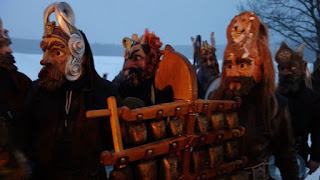Twelve Days of Christmas
Germany is fairly quiet during the twelve days of Christmas. That is probably true in most places. In Germany, during the dark days between the years, it is better to stay home. An article on the Bavarian Radio website says that this is good advice not only because of the Corona virus, but also because some people fear the Rauhnächte (hairy nights) between the years from the 25th of December until the 6th of January. What follows is my translation of the article at
https://www.br.de/nachrichten/kultur/mythos-rauhnaechte-duestere-zeit-zwischen-den-jahren,Sst9rlI
According to old folk tales, after Christmas begins the time when it seems advisable to stay home and let certain kinds of work wait. That includes washing clothes. The reason is that clothes left on the line to dry could snare evil spirits who carry out their evil deeds in the night-time.
The Germanic god Wotan was demonized
 |
| People wearing Perchten costumes |
Christianity competed with heathen customs
At the same time, the Celts also noticed that the lunar year had 354 days but the solar year had 365. They inserted eleven leap days (twelve leap nights) during which the doors to another world stood open, according to their beliefs. The myths of these twelve nights were easily overtaken by Christianity, because the Church had already moved its high feast from the end of December to the beginning of January in reaction to the pagan cult festivals. First, the Roman emperor moved the beginning of the year from the first of March to the first of January, and then the pope decided that Christmas would be celebrated on December 25th in answer to the Roman sun-god cult.
The myth is continued creatively in Nuremberg
When the Church set the epiphany of the three kings on January 6th, the heathen Rauhnächte suddenly had two Christian festivals to bound the time, that is, the twelve days of Christmas, with the beginning of the year in the middle. The Synod of Tours in the year 567 designated the twelve days between Christmas and the epiphany the time "between the years". They have been called the Twelve Days of Christmas ever since.
Rauhnächte got a double meaning through a play on words where "Rauh" is interpreted as "Rauch", which means "smoke", and "Weihrauch" is the incense smoke that according to tradition was spread throughout the house to keep the evil spirits at bay during the Christmas season. Nuremberg has started its own Rauhnächte festival, similar to the one in Kirchseeon, in order to conjure up the good spirits of the new year with light-art displays in the old town.
Nürnberg bietet dafür heuer ein eigenes Rauhnächte-Festival
Labels: pagan, Rauhnächte, twelve days of Christmas
